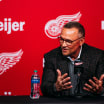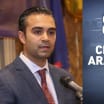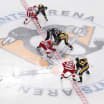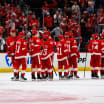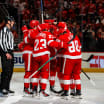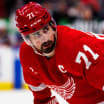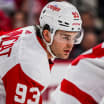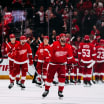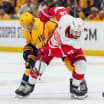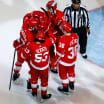If you were to assess the career of Detroit Red Wings legend Ted Lindsay merely from the perspective of a hockey player, it would deliver a compelling tale of desire, ability and success.
Yet as great a performer as Lindsay, who died Monday at the age of 93, was between the boards -- among the best who ever played in the NHL -- Lindsay, the man, was a far more impressive and accomplished figure.
Ted Lindsay left invaluable legacy, on and off the ice
Red Wings Hall of Famer spearheaded creation of players association and supported autism awareness
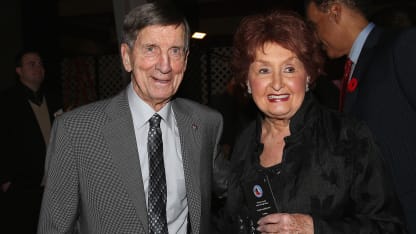
© Bruce Bennett/Getty Images
By
Bob Duff @asktheduffer / Special to DetroitRedWings.com
The sum of his parts added up to an equation of which the outcome was singularly unparalleled in the history of the game.
Lindsay was a Hockey Hall of Famer on the ice. He then helped turned the Red Wings franchise back in the right direction as a general manager.
"Ted was a persistent, courageous and determined man both on and off the ice," the Lindsay family said in a statement. "He was a man of many firsts. We are comforted in knowing that the Ted Lindsay legacy will forever be a part of history and are so proud of the many lives he helped change for the better through his tireless humanitarian work."
He was a leader of men, someone who, no matter how large an icon he became, never forgot where he came from, or the people who helped put him there.
"He was all about doing the right thing," former Wings defenseman Chris Chelios said of Lindsay. "Every player that has played owes him a lot for the sacrifices that he made, the price he paid to make it better for us in the future."
His legacy was larger than life but his persona was always down to earth, approachable.
"I got to know Ted real well because he'd be around the room all the time, so much so that we installed a (Lindsay No. 7) locker," Red Wings senior vice president Jimmy Devellano said. "I can remember when he was in his 70s, he'd be working out, skating, had on the equipment, he'd be around the team, talking to the players.
"They'd all look up to him. They knew his history, they saw his sweater hanging from the rafters. He was a joy to have around because he had such great pride in the Red Wings."
Lindsay was a frequent visitor to the Red Wings dressing room long after his playing days concluded, serving as an impromptu welcoming committee for new players.
"As someone who was a hockey player growing up in Michigan, he's a man who built Hockeytown," Red Wings center Dylan Larkin said. "Someone that embodies everything that it means to be a Red Wing, not only as a player but as a person.
"A big person in the community, with all the work he's done through his charity and his interaction with his fans. Just a class act, someone I really looked up to and who paved a great path for guys like myself and other players to follow."
The numbers add up quickly and impressively when Lindsay's career is tabulated. Four Stanley Cup wins, two as captain of the Red Wings. An Art Ross Trophy winner. A seven-time NHL First All-Star Team selection. Eleven NHL All-Star Game appearances. A Memorial Cup title. Lindsay led the NHL in goals once, in assists twice and in penalty minutes once.
He and fellow Hall of Famer Nels Stewart remain the only players in NHL history to have led the league in scoring and in penalty minutes during their careers.
"I would say in our 93-year history, I have no trouble telling you Ted Lindsay would be in the top 10 of the best players that ever played for the Red Wings," Devellano said. "He was tenacious, he was ferocious, really, really tough for a guy his size. He had a meanness about him and he wanted to win."
Still, as much as all these digits and achievements measure up magnificently, they don't do justice in capturing the measure of the man.
On the ice, Lindsay was a player who asked no quarter and gave none. He always had his game face on, no matter the locale of the battle.
"You'd get to the All-Star Game and Ted Lindsay would walk by and grunt," fellow Hall of Famer and former Wings teammate Andy Bathgate once said. "That's the only words you'd get out of him."
Another Hall of Famer and Wings teammate was more blunt in describing Lindsay's passionate approach to game night.
"A guy like Lindsay would carve your eyes out," Marcel Pronovost said. "No one was more competitive."
Lindsay never sought to hide his disdain for the opposition.
"I hated everybody I played against and they hated me," Lindsay would explain. "If we were in another city and you saw one of the opposing players walking down the street, either you or the other guy would have to move to the other side so you didn't have to pass each other."
Wings coach Jeff Blashill fondly recalled one of his earliest encounters with Lindsay in the hallways of Joe Louis Arena as he was prepping the team for training camp and he got a piece of advice from the legend.
"'You just tell those players one thing,'" Blashill said, remembering Lindsay's sage words. "'If they go into the corner with another guy and don't come up with the puck, they're a horse(bleep) hockey player.'
"I just thought that kind of embodied his approach to hockey. It was true in the 1950s and it's true today."
Still, this man who took on all comers, who despised opponents and who was equally despised by them, would be the one to put his career on the line in order to help form the NHLPA in 1956.
"Don't ask me why I did it," Lindsay would say. "I was one of the better hockey players in the world and I was having one of my best years as a Red Wing at the time. I felt a responsibility, because I saw fellows being sent down. The clubs could send you home -- they could send me home -- and they didn't owe you five cents.
"That's not right."
“Terrible Ted” was one of the nicest men in hockey. Every player should be thankful for his courage to create the Players Association, which has grown into partnership between the players and owners of the NHL. He was a true champion on and off the ice and will be deeply missed.
— Wayne Gretzky (@WayneGretzky) March 4, 2019
It was an act that resonated with players of that day, and still does with the players of today.
"Obviously, his track record of all the Cups, what he accomplished as a player speaks for itself but what he did off the ice as far as forming the Players' Association, how much he's done for autism awareness, those things are the things that stand out maybe even more," Wings defenseman Niklas Kronwall said.
You could argue that Lindsay was born to be a member of the Red Wings. Growing up in the Northern Ontario town of Kirkland Lake, on a clear night, the signal from WJR-AM would reach this tiny hamlet and Lindsay would delight in listening to the call of Red Wings games.
"They played my kind of hockey and that's how I became a Red Wing fan, not ever knowing I'd play for them," Lindsay recalled to the Hockey Hall of Fame.
Hockey was in his genes. Lindsay's father, Bert, was a pro goaltender who played alongside some of the game's early greats, including Cyclone Taylor, Lester Patrick and Art Ross. On Dec. 19, 1917, Bert Lindsay got the win in the first-ever NHL game, backstopping the Montreal Wanderers to victory over Toronto.
When Lindsay made his Red Wings debut on Oct. 29, 1944 against the Boston Bruins, he became the first son of an original NHLer to play in the league.
Lindsay made the team as a 19-year-old and would never skate a single second in the minor leagues, a rare feat in the days of the six-team NHL.
By the 1947-48 season, Lindsay scored an NHL-leading 33 goals and was named to the NHL's First All-Star Team.
"I have no hesitation in naming Ted Lindsay the best left-winger we have ever had," Red Wings GM Jack Adams said.
Soon, Wings coach Tommy Ivan would strike gold, uniting Lindsay on a forward unit with captain Sid Abel and Gordie Howe, a trio that would be dubbed The Production Line. In 1949-50 as the Wings won the Stanley Cup, Lindsay, Abel and Howe finished 1-2-3 in the NHL scoring race, something that no other Stanley Cup championship squad has ever accomplished.
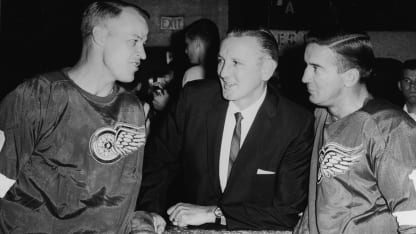
© B Bennett/Getty Images
"My job on the Production Line was just being a good left-winger," Lindsay explained. "The three of us were all greatly talented. Our simple way of playing was that we all threw the puck to where the hole was.
"Nobody could ever figure out what we were doing, but we all knew what each other was doing."
Lindsay made Stanley Cup history in the spring of 1950 on Olympia Stadium ice. Emotional after a double-overtime triumph over the New York Rangers in Game 7 of the final series, Lindsay impulsively snatched the Cup off its perch on a table at center ice and skated with it around the rink, allowing fans to see and touch the storied mug and creating what's become a staple of the Stanley Cup celebration.
"There was only chicken wire at the far ends," Lindsay remembered. "The fans used to sit with their elbows on the dasher. So when they presented the Cup, I just went over and picked it up. I wasn't looking to start a tradition. I wanted the fans to see what we were playing for, to let them see some of the names on it."
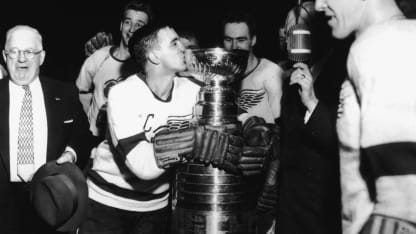
© B Bennett/Getty Images
Lindsay's combination of talent, toughness and fearless competitiveness made him a hometown hero and public enemy No. 1 in opposing rinks.
"I hated everybody I played against and they hated me," Lindsay would bluntly put it. "I had the idea I should beat up every player I tangled with and nothing ever convinced me it wasn't a good idea."
His nicknames -- Scarface and Terrible Ted -- were self-explanatory of his nature on the ice.
"It was always a compliment," Lindsay said. "At least I took it that way. I was called Scarface, because it seemed like I always had either a black eye or a cut. They were from sticks, some were from pucks and many of them were from fists.
"I used to be homely when I was younger, but I had all this involuntary plastic surgery."
Traded to Chicago in 1957, Lindsay retired in 1960 but made a comeback with the Wings at the age of 39 in 1964, scoring 14 goals and displaying that Father Time had taken none of his irascibility, leading the first-place Wings with 173 penalty minutes.
Lindsay would return to help the Red Wings once more in 1977, taking over as GM of the team. He led them to their first playoff berth since 1970 and their first playoff series win since 1966.
On Nov. 10, 1991, the Wings retired Lindsay's No. 7 jersey. In 2010, the NHLPA recognized Lindsay's role in their creation, renaming their most outstanding player honor the Ted Lindsay Award.
His Ted Lindsay Foundation has raised millions for autism research, and Larkin intends to ensure it continues as the new face of the organization.
"What he started through the Ted Lindsay Foundation, for not only kids and people with autism, but for the families involved, I'm really humbled and really excited to carry on what he started and continue his legacy and the great work he started to distinguish it," Larkin said.
Lindsay never stopped contributing, never stopped trying to help, right until the end.
"My last conversation, there were some issues with the PA about a month ago," Chelios recalled. "The last thing he said was, 'Whenever you need me, I'll be there.'
"That's exactly the type of person he was."
Perhaps Kronwall summed up the aura that surrounded Lindsay the best.
"He always had the same attitude -- extremely positive and just cared so much about the Red Wings and the organization," Kronwall said. "Anytime you had the chance to be around him just made you feel better about yourself."
Ted Lindsay’s family appreciates all of the kind words and prayers. Ted has so much love for all of his fans. Arrangements will be announced when they are finalized.
— TedLindsayFoundation (@TedLindsay07) March 4, 2019


